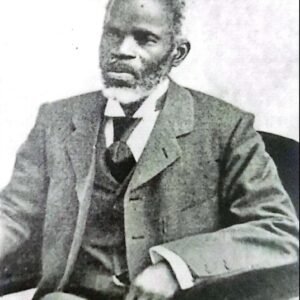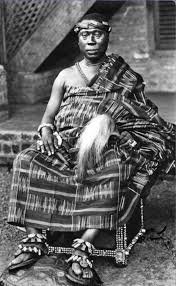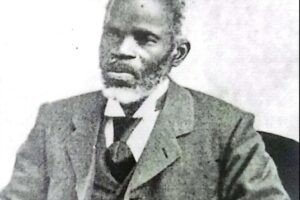In the intricate tapestry of Ghana’s history, the name Jacob Wilson Sey stands tall, yet his legacy has long been obscured from the public eye. Born on March 10, 1832, to a humble carpenter and farmer in the Central Region, Sey’s journey from poverty to becoming Ghana’s first multi-millionaire is a testament to his indomitable spirit and unwavering devotion to his people.
However, the true measure of this remarkable man lies not in his financial success, but in his pivotal role as a pioneering activist who fought tirelessly to defend the ancestral lands and rights of the Ghanaian people against the encroaching colonial powers. In the annals of Ghana’s history, few figures loom as large as Jacob Wilson Sey, yet his name remains largely unknown to the masses. Until now.

It is a travesty, an act of grave injustice, that this nation has not found it fit to honour such a noble patriot – a titan whose foresight, tenacity, and selfless sacrifice shaped the very foundations of Ghana’s independence movement. Sey’s story deserves to be etched into the collective consciousness of every Ghanaian, a shining beacon of patriotism and social justice that will inspire generations to come.
This forgotten pioneer’s life is a tapestry of triumph over adversity, a remarkable odyssey that deserves to be celebrated and revered as a pivotal chapter in Ghana’s storied history. It is time to bring Jacob Wilson Sey out of the shadows and into the light, where his legacy can be rightfully acknowledged and his name immortalized as one of the nation’s most influential and visionary leaders.
Rising from Adversity
Sey’s early life was marked by hardship and lack of formal education. Following in his father’s footsteps, he worked as a carpenter while supplementing his income by selling palm wine. His entrepreneurial spirit blossomed when he ventured into coffin making, earning him local recognition and the nickname “Kwaa Bonyi,” or the humorous coffin maker. This venture showcased his ingenuity and resilience, enabling him to rise above his circumstances and lay the groundwork for his future endeavors.
Confronting Colonial Oppression
As Sey’s business flourished, the British colonial administration began to tighten its grip on the Gold Coast. Laws such as the Crown Bill of 1894 and the Public Land Ordinance of 1896 posed significant threats to traditional land rights, allowing for land seizures under the pretense of protecting local interests. Sey, despite being illiterate, understood the implications of these policies and the potential for irreversible loss of land for indigenous people.
In response, Sey boldly founded the Gold Coast Aborigines’ Right Protection Society (ARPS) in 1897 in Cape Coast. This organization united educated Ghanaians and local chiefs in a collective fight against colonial land policies, marking the beginning of organized resistance against oppression.
A Pioneering Fight for Justice
Sey’s leadership within the ARPS exemplified his unwavering commitment to justice. Recognizing the need for high-level intervention, he sponsored a deputation to meet Queen Victoria. This mission required substantial financial resources, which Sey was able to provide due to his wealth.
On May 24, 1898, he and his delegation set sail on the Alba ship to England, armed with a petition signed by key members of the ARPS and 15 local chiefs. Their mission was clear: to plead their case directly to the Queen and halt the damaging land bills threatening their homeland.
A Historic Victory for Indigenous Rights
The meeting with Queen Victoria was a watershed moment in Ghana’s history. The delegation successfully presented their petition, leading to an official letter from the Queen that abrogated the Land Bill of 1897. This victory not only protected Ghanaian lands from complete British ownership but also established a precedent that resonated throughout West Africa. It played a crucial role in safeguarding the rights of indigenous peoples, preventing conditions akin to apartheid in the region.
A Legacy of Philanthropy and Community Service
Beyond his political achievements, Jacob Wilson Sey was a dedicated philanthropist. He leveraged his wealth to uplift his community, advocating for the construction of parks, supporting educational institutions, and aiding the Methodist Church. His vision extended to renovating significant buildings to provide housing for the elite, ensuring that his success translated into tangible benefits for those around him.

Sey’s commitment to cultural heritage was evident in his support for exiled kings and chiefs, reinforcing the importance of traditional leadership and identity. His life was a testament to the belief that personal success should contribute to the greater good of society.
Recognizing an Unsung Hero
Despite his monumental contributions, Jacob Wilson Sey remains an unsung hero in Ghanaian history. His narrative is one of resilience, leadership, and an unwavering dedication to justice. He passed away on May 22, 1902, at the age of 70, leaving behind a legacy that laid the groundwork for future land rights movements in Ghana.
The Urgent Call for Recognition
As Ghana continues its journey of growth and development, it becomes increasingly vital to recognize figures like Jacob Wilson Sey, who fought tirelessly for the rights of their people. Appreciating their sacrifices and contributions fosters a sense of national pride and helps ensure that the lessons of the past guide future generations.
The Significance of Honoring Unsung Heroes
Experts underline the importance of acknowledging such figures. Dr. Nana Baah Wiredu, a Tourism Consultant, emphasizes, “Celebrating figures like Jacob Wilson Sey is vital for our national identity. His bravery and commitment to justice inspire us to uphold the rights of all Ghanaians today.” This recognition is crucial in a society where many contributions risk being overlooked.
Cultural advocate Nana Kwesi Boateng echoes this sentiment, stating, “Acknowledging our unsung heroes allows us to build a richer narrative of our history, reminding us of the resilience and patriotism we must embody.” Such recognition not only honors the past but also encourages current and future generations to embrace these values in their lives.
Inspiring the Next Generation
Honoring Jacob Wilson Sey’s legacy extends beyond mere remembrance; it is also about inspiring future generations. His life exemplifies the power of determination and community action. Dr. Wiredu articulates, “By celebrating his achievements, we can motivate young Ghanaians to engage in civic responsibilities and advocate for justice in their communities.”
Furthermore, Nana Boateng highlights the importance of education in this regard: “Incorporating stories of unsung heroes into educational curricula can instill a sense of pride and responsibility in our youth, fostering a generation that values service to their country.”
A Call to Action for Collective Recognition
The call to honor Jacob Wilson Sey is a call to action for institutions, educators, and community leaders. Establishing memorials, integrating his story into historical narratives, and incorporating his legacy into educational programs can help ensure that his contributions endure.
Bringing his story to the forefront cultivates a deeper understanding of our past and lays a stronger foundation for our future. Celebrating Sey’s legacy is not merely about honoring an individual; it is about affirming the values of justice, equality, and community service essential for Ghana’s continued progress. Through this collective effort, we can ensure that the sacrifices of unsung heroes like Jacob Wilson Sey are never forgotten, paving the way for a bright and equitable future for all Ghanaians.
In conclusion, recognizing Jacob Wilson Sey not only honors his memory but also strengthens the fabric of Ghanaian society by inspiring a culture of justice, resilience, and philanthropy that all Ghanaians can aspire to emulate.








